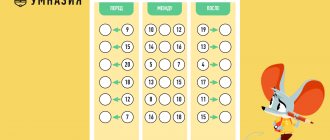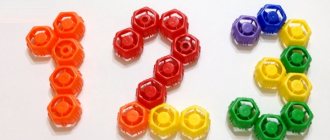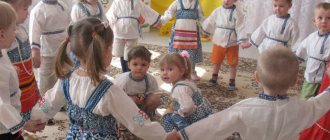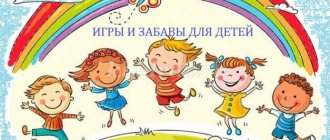All children in the world are united by a love of games.
Play is a natural need for a child, since it is in the form of play that children learn about the world, understand how it works, and consciously comprehend the experience gained.
Play is important not just as a source of joy and good mood, it develops the brain, imagination, creativity, vocabulary, social skills, the ability to learn and perceive more complex information.
How do 6-7 year old children develop?
At this age, the baby’s thinking abilities enter a new, better stage of development.
By age 6, most children:
- master reading, writing, counting to 20;
- understand the simplest time intervals;
- focus longer on one solution to one logical problem;
- their reasoning becomes more meaningful;
- understand information better by listening.
What games are useful at this age?
For a preschooler, different forms of games will be useful.
Psychologists recommend involving children in the following game formats:
- child-initiated play;
- play initiated by an adult;
- a traditional game when both a child and an adult can take the initiative.
From the point of view of benefits, the most significant games are those offered by adults, since in this case the child finds himself in a learning situation, gets acquainted with new words, concepts and can make this situation manageable.
As for choosing a specific game format, it all depends on the situation. For the street, outdoor games are selected that contain an element of sports. At home, you can play board games or role-playing games, or assemble a construction set.
1. Outdoor games develop coordination, strength, endurance, and reaction speed. At the age of 6-7 years, the game lasts about half an hour.
2. Board games help brighten up your leisure time when the weather is bad outside. With the help of cubes, puzzles, figures, cards, the child improves his skills - logic, spatial thinking, social interaction, speech, concentration, will.
There are a huge number of board games - walkers, puzzles, cubes, mosaics, construction sets, flashcards, strategies.
3. Educational games - in this case we are talking about the targeted development of a specific skill or ability, for example, speech, gross motor skills, intelligence, imagination.
The use of such games prepares fertile ground for the further development of the child’s creative abilities and talents. The training program is structured from simple to complex, but the conditions of each task should be slightly ahead of the child’s developmental level.
Educational games for children 5 – 6 years old by goal groups
| Target | Game name |
| Fine motor skills training | 1. Stringing |
| 2. Coloring | |
| 3. Origami | |
| 4. Shadow theater | |
| 5. Sort out the cereal | |
| Development of attention | 1. What has changed? |
| 2. What to do? | |
| 3. Claps | |
| 4 Elements | |
| 5. Guess the toy | |
| Development of logical thinking | 1. Drawings from geometric shapes |
| 2. Endings | |
| 3. Fill in the circle | |
| 4. Good - bad | |
| 5. What happens? | |
| Speech development | 1. Complete the sentence |
| 2. Daily routine | |
| 3. Who eats this? | |
| 4. 3 words | |
| 5. What was what? | |
| Numeracy skills | 1. Where is the ball? |
| 2. Forward and backward counting | |
| 3. Feed the animal | |
| 4. Measurements | |
| 5. Cards with numbers |
Games to develop fine motor skills
Since the initial development of relevant skills has already been established at this age, the following games will help further improve fine motor skills in older preschoolers:
- Stringing. You can string beads, rings, buttons, pasta and other items. You will also need fishing line or strong thread. You can hold a “fair” where beads, bracelets and other jewelry made by the children will be presented.
- Coloring. The game is held in the form of a coloring master class or competition. Children are given pictures with outlines of shapes and explained how to hatch. Pictures need to be painted in straight and diagonal directions.
- Origami. Children are given paper and explained how to fold the figures. Then you can offer to organize a competition or play paper toy store.
- Shadow play. Turn off the lights in the room and point the light source at the screen (from a distance of approximately 4 m). Children are shown how to use hand movements between a light source and a screen to create pictures on the screen. You can act out scenes with shadow characters.
- We sort through the cereal. For this game you need to mix 2 types of cereals (for example, buckwheat and rice or millet) and ask the child to help sort the cereal into their jars. Subsequently, the task can be complicated by adding 1 or 2 more types of cereals.
Experts believe that the development of fine motor skills is directly related to the development of speech and intelligence in general.
E. O. Komarovsky
Pediatrician, Ph.D.
Working with your fingers affects the speech areas of the brain. It is necessary to begin developing fine motor skills from six months to 6 years. As a result, speech is formed correctly, memory and imagination are stimulated.
— E. O. Komarovsky Pediatrician, Ph.D.
Games to develop attention
The following games will help your child learn to acquire, accumulate and apply new knowledge:
- What changed? Up to 7 (but not less than 3) different toys are placed in front of the child. At a signal, the child closes his eyes, and the adult removes one of the toys. Then, again at a signal, the child must open his eyes and guess which toy is missing.
- What to do? Before the game starts, children are explained what action to perform when naming a particular word. Then the children walk in a circle, and the leader calls out any of the previously discussed words. In this case, players must perform a certain action (for example, “stork” - stand on one leg, “crawfish” - walk backwards, “hare” - jump, etc.).
- Claps. This is a game similar to the previous one. Only instead of a word, children must perform a certain action for a pre-agreed number of claps. So, for example, 1 clap can mean “stork”, 2 – “crayfish”, 3 – “hare”, etc.).
- Elements. Children sit in a circle. When the leader names a certain element, they must perform a pre-agreed action (for example, “water” - lower your arms, “fire” - raise, “air” - spread your arms to the sides, “earth” - cross your chest).
- Guess the toy. The child needs to depict some actions that would characterize the proposed toys (for example, show how a bear, a fox, etc. behaves).
Julia
In pedagogical activity, one of the main directions is the development of attention, since the quality of teaching will depend on it in the future.
- Julia
Games to develop logical thinking
Logical thinking skills are necessary as preparation for further education. The following games will help develop the ability to think logically:
- Drawing of geometric shapes. Children are given various geometric shapes drawn on a piece of paper. The guys must draw an object or character from the resulting geometric figure (for example, an apple from a ball, etc.).
- Endings. Children are asked to complete sentences like: “Masha left the house before Vera, which means Vera is ... (later Masha).”
- Fill in the circle. Children are given sheets of paper with 6 circles drawn several times and are asked to paint them in such a way that there are as many filled circles as unfilled ones. The one who offers the most shading options will win.
- Good bad. The child is asked to analyze any phenomenon from all sides, paying attention to positive and negative aspects, for example: “A lot of mosquitoes are bad, they bite, but it’s good that the birds have something to eat. There are no mosquitoes - it’s good, but the bad thing is that the birds have nothing to eat, they will fly to other places and there will be a lot of mosquitoes.”
- What happens? Children are encouraged to ask each other questions and take turns answering, for example: “What is white? (cloud, towel, etc.)” “What is big? (joy, car, mountain, etc.).”
Elena
Orenburg
A child’s logical thinking needs to be developed systematically and in a timely manner, so that in the future he can study well and achieve his goals.
— Elena Orenburg
Speech development games
Speech development is an important stage of learning; the following games will help with this, by the way, closely related to the previous group of logic lessons:
- End of sentence. Children are asked to complete the sentences based on the context (Vita didn’t come today because ... (sick); dad brought ice cream and put ... (in the refrigerator); Marina is going to the store to ... (buy groceries)).
- Daily regime. Children are shown pictures of different activities during the day. The children are asked to place them in the correct order.
- Who eats this? Pictures depicting various animals are given, and it is asked to determine which of them should be given, for example, grain, honey, apples, grass, etc.
- 3 words. Children are asked to name 3 words as an answer to one question, for example: “What can you cook? (egg, meat, pasta).”
- What was what? The presenter asks questions like: “Who used to be a chicken, a butterfly, a horse?”, “What used to be bread, a sweater, a table?”, and the children need to answer them.
A. N. Leontiev
Soviet psychologist, author of the general psychological theory of activity
Speech occupies a central place in mental development, the process of its development is development itself.
— A. N. Leontyev Soviet psychologist, author of the general psychological theory of activity
Games 30. Plant
First of all, you need to make a plant - a tree, a flower - from any available materials. Then the child composes a fairy tale about him. The main thing is that in the story the child describes in detail how the plant feels - is it comfortable or is something bothering it.
Through these metaphors, an adult can understand what is bothering the child. If there is a cause for concern, ask your child what you can do to help the plant - build a fence, call a fairy, plant other trees. This way the baby will use the example of a fairy tale to cope with his anxieties.
Games 31. Face games
In children who have suffered some unpleasant events in life, a frozen mask may appear on their face and emotions disappear. You can motivate your child in several ways - invite him to play tricks, make funny faces with him, or organize a home theater.
Games 32. Simple holidays
Allow your baby to feel the holiday in your life as often as possible. Try to turn every simple event into something bright and unusual. For example, the festival of making the bed, washing, the festival of lunch. Be sure to record any of your child’s achievements, write them down or draw them - this motivates and builds confidence in yourself and your abilities.
Games 33. Color therapy
If your child often returns to unpleasant events in the past, focus his attention on the current day, for example, come up with a specific color for each day of the week and try to stick to it. For example, let Monday be blue - pick up such clothes, look for blue objects around.
Games 34. Schedule
To stabilize a child’s condition after a stressful situation, it is necessary to structure his daily routine, draw up a schedule, and decorate it. The kid must monitor its implementation. On the one hand, it teaches discipline, and on the other, it distracts from unpleasant thoughts.
Advice! Anxious children prone to stress intuitively choose outdoor games where they need to jump. This helps relieve tension and feel supported. Create an area for your child where he can jump safely and happily.
Conflict situations sometimes occur between children, and here play becomes critically important, since with its help the child relieves stress and relaxes . Of course, games should be appropriate for the child’s age and development, be diverse and useful. This is what we will talk about in our material.
Where to find time to play with your child
This question is asked by many parents, since modern moms and dads are busy people who have a lot of household responsibilities, work, of course, and a natural desire to take time for themselves and relax. Due to the fact that there is not enough time to spend with the baby, parents often worry and worry. Psychologists assure that you can find time to communicate with your child if you follow simple tips.
Tip 1 – play with your child and mind your own business at the same time.
Games that do not require special training or additional items can be played in the kitchen, bathroom, or on the street. If you don’t feel like playing, involve your child in homework, do something together, for example, make pizza, or just let your child help you.
The main thing is to talk to the child more, explain, praise and support.
Tip 2 – use any free minute.
Transport, queues, the road to somewhere - this time can be used profitably. Tell your child about natural phenomena, make riddles, compose fairy tales, play counting and words.
Tip 3 – games and activities should become a habit.
Of course, we are not talking about classes for an hour or two. Make it a rule to work with your child every day for 15-20 minutes; this will be quite enough for a child aged 6-7 years. For example, read a book to your child before bed.
Tip 4 – try to create a nurturing environment at home.
Use posters, manuals, cards, magnetic games. The more educational objects there are around a child, the faster he will remember information. Please note that developmental aids should be bright and colorful.
Tip 5 – find company for your child.
If this is the case and you cannot play with your baby, try to find children for him with whom he can spend his time.
Intelligence of a child aged 6-7 years
At this age, children have already formed personalities and have their own views on the world around them and what is happening in it. The child understands his position both in the children's team and among adults, and accordingly builds a line of behavior and forms a certain attitude towards the people who surround him.
The level of emotional development in children 6-7 years old is also quite high. They show sympathy , empathize, feel the mood of other people, and offer help.
- We are talking about children who are almost first graders, they can control their mood, follow the instructions and requests of adults, and take part in group and individual activities.
Advice! Since children 6-7 years old easily navigate circumstances, parents can give their child the basics of personal safety and teach them to find a way out of difficult situations.
2. At 6-7 years old, children show an active interest in new knowledge, since at this age the memory capacity increases, the child’s attention becomes more concentrated, and the vocabulary expands (up to 6 thousand words).
3. Parents need to continue classes on the development of children’s speech, familiarize children with the structure of language, in addition, develop fine motor skills, logic, and the ability to systematize objects by characteristics.
What skills do older preschoolers need to develop?
5-6 year old children are very inquisitive. Reading fairy tales and stories with adults, learning to read, count and draw perfectly stimulates interest in understanding the world around us.
The main areas of study during this period:
- fine motor skills training;
- development of attention;
- development of logic;
- speech development;
- numeracy skills.
In this regard, it is possible to divide developmental activities for older preschoolers into the above groups.
Classes for children are conducted in the form of games.







